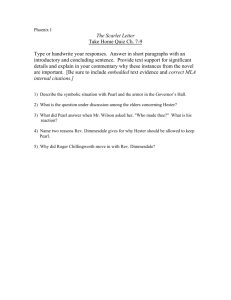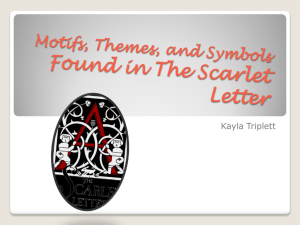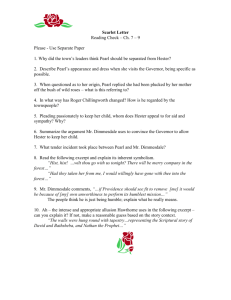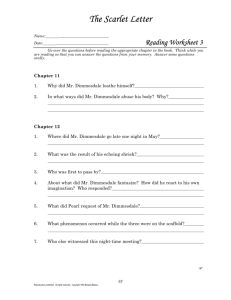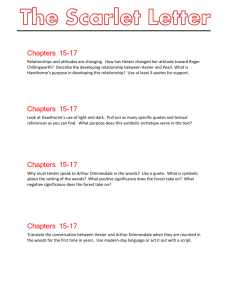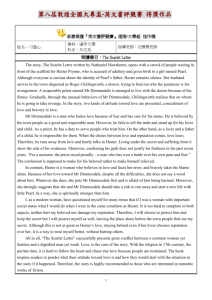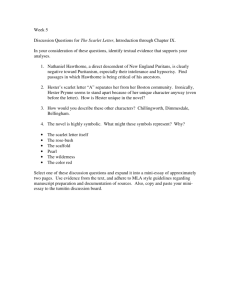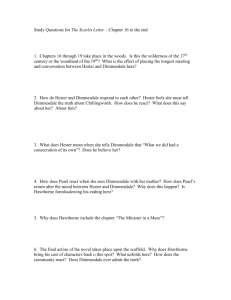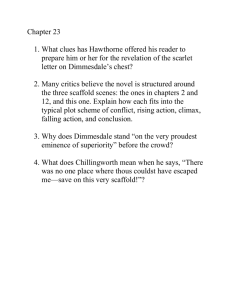Faust
advertisement
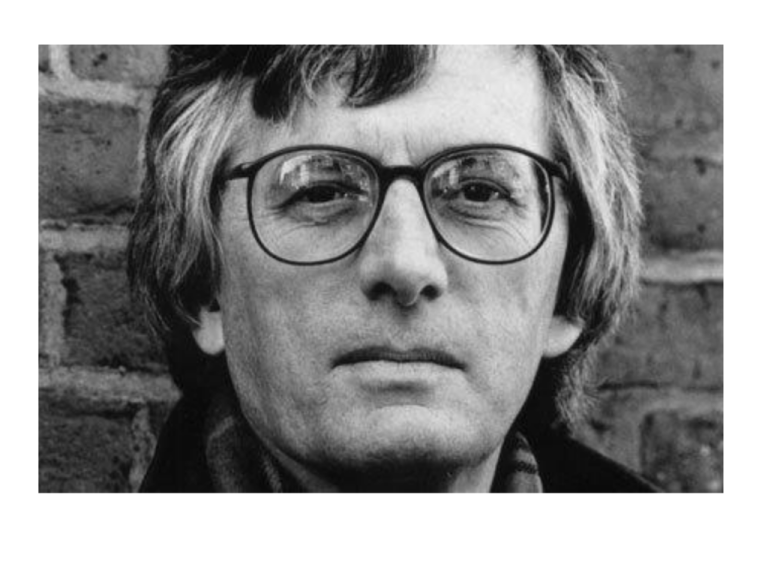
Read the poem “Childhood is a Kingdom Where Nobody Dies” and respond to the following questions: • Does the poem appear to be more about childhood or about loss? Explain with evidence from the text. • How does the poet use tone and voice to develop our understanding of the situation throughout the poem? How much does the tone shift from beginning to the end of the poem? Give examples to support your answer. • Use the poem’s argument as a framework for discussing the Scarlet Letter. What similar theme is explored in the opening chapter? • In what ways would you define childhood and maturity? What experiences are necessary in your own life to reach adulthood? “Mood to Burn Bridges” • In what ways is the speaker in this song similar to Hester? In what ways is she different? Give evidence. • How does the speaker’s tone underscore the hypocrisy of the town around her? In what ways is this similar to the Puritan community within the Scarlet Letter? Give evidence from both texts. • In what ways does the media change the way the story is told? Which did you personally find more engaging? Why? Pick out specific elements that influenced you and discuss their influence. • Have you ever felt that you were called out on something that everyone else was getting away with? How would such a situation influence your ability to build relationships with others? Would you be affected the same way the speaker and Hester were? Read the passage from page 31 • “Perhaps there was a more real torture in her first unattended footsteps from the threshold of the prison, than even in the procession and spectacle that have been described, where she was made the common infamy, at which all mankind was summoned to point its finger. Then, she was supported by an unnatural tension of the nerves, and by all the combative energy of her character, which enabled her to convert the scene into a kind of lurid triumph. It was, moreover, a separate and insulated event, to occur but once in her lifetime, and to meet which, therefore, reckless of economy, she might call up the vital strength that would have sufficed for many quiet years. The very law that condemned her—a giant of stern features, but with vigor to support, as well as to annihilate, in his iron arm—had held her up, through the terrible ordeal of her ignominy. But now, with this unattended walk from her prison-door, began the daily custom, and she must either sustain and carry it forward by the ordinary resources of her nature, or sink beneath it. She could no longer borrow from the future, to help her through the present grief. To-morrow would bring its own trial with it; so would the next day, and so would the next; each its own trial, and yet the very same that was now so unutterably grievous to be borne.” Questions over the passage • Why is the experience of being released from prison in some ways harder for Hester than being publicly shamed? • How does the moment add to Hester’s character and our sympathy for Hester? Provide evidence. • Have you ever had an experience which you normally would have doubted your ability to perform, but by nature of its being short, you found you could do it? Explain how time and timing influence your ability to perform difficult tasks. Beowulf, lines 1931-1962 • What kind of a leader is Queen Modthryth? How does she relate to Anglo-Saxon characteristics of leadership? Give evidence from the text (include specific line numbers!) • Why does the book interrupt the description of Hygelac and his wife Hygd to talk about Queen Modthryth? What does it add to the story since it’s not part of the plot? • What lesson did the poet expect us to take from the story of Queen Modthryth? Give evidence from the text. Beowulf • Beowulf tell his king Hygelac about his trip to save the Danes. What does his telling of the story show about him? How does he talk about his actions? How does he talk about the Danes? • What’s going on with the Heathobards? What does this mean for the Danes? What do you know about Dragons? • What does a dragon look and act like? • What do dragons represent in stories? • What are some books/movies/songs with dragons in them? Look at page 77-78 • How does the people’s opinion of Chillingworth change over time? What influences this change? • List the symbols associated with Chillingworth here. How do the people interpret them? • How accurate are popular opinions of people? How well can a crowd really know someone? • How does popular opinion influence our understanding of an event or person? Is it easier or harder to make a fair judgment if we hear the popular opinion first? • Give a time when you were given strong opinions before an experience (talking about a movie before you saw it, talking about a person before you met him or her, etc.) How did it influence your ability to come to form your own opinions? Dimmesdale • Make a moral judgment about Dimmesdale. Is he good or bad? Do you like him or not? Is he sympathetic or not? Does he deserve what’s happening to him? • Take notes on the evidence for or against Dimmesdale in chapters X-XI. • Write a thesis arguing your opinion of Dimmesdale. Then, complete the introductory paragraph in which you argue whether or not Dimmesdale is a good person. Afterwards, outline the evidence you would use if you were to extend this into a full essay. Key Passages • Write the line numbers • Summarize the passage • Tell its significance to the poem and our study (may include theme, symbol, characterization, plot development, cultural significance, poetic style, etc) • Create an image that captures the idea of the passage. Terms • • • • • • • Kenning Alliteration Litotes (understatement) Mead hall Thane Scop Lay Characters • • • • • • • Beowulf Hrothgar Unferth Wiglaf Hygelac Wealtheow Hygd Monsters • Grendel • Grendel’s mother • Dragon Characteristics of heroism/leadership • • • • Generosity Brave Capable in battle Loyal Themes • • • • The Dangers of Pride The Dangers of Greed Heroism through Loyalty Loss and its effect Hester and Dimmesdale • Hester and Dimmesdale both committed the same sin, but respond to it very differently. How are their consequences different? How is their response to guilt different? How is their self-image different? • If they could somehow have ended up in opposite positions, with Dimmesdale held responsible and Hester let off without anyone knowing, how would the story have been different? How would their personalities have fit those opposite roles? • Watch the clip from the series CTRL. Lizzie and Stuart have different opinions about past mistakes. How do their ideas apply to Hester and Dimmesdale? Who do you side with, Lizzie or Stuart? Look at page 12-13 of Faust. • How is Faust characterized on these pages? What traits does he seem to have? How do you know? • Faust is an early and excellent example of Romanticism. Given what you know about Romanticism, what characteristics of Romantic literature do you see on these pages? Give examples. • How was Faust’s problem in these pages hinted at in the prologue in heaven? Compare Mephisto’s description of Faust on page 10 to what we actually see of Faust on these pages. Give evidence. • First impressions are important. How do you feel about the story of Faust based upon your first impressions of him? Look at the conversations on pages 24-25. • List as many topics of conversation as you see. • List as many types of people that you see. • Why would Goethe interrupt the progress of his story for two and a half pages of irrelevant dialogue? What is the significance of this portion of the scene? What does it accomplish in the scope of the story? • Consider what kinds of conversations you have around the lunch table or in the halls. What purpose do most of those conversations have? What do they reveal about you and your friends? Pick a few things you’ve talked about to someone in the last few days and discuss what it reveals about your goals and priorities in life, even if they conversation was relatively simple or asinine (ie. Your discussion of the recent VMAs or a game.) Into the Woods • There are many symbols in these chapters. What does the woods represent? What does the sunlight represent? What does the brook represent? • How does the setting influence the action in these chapters? What would happen differently if Hester and Dimmesdale were to meet in the town or another location? • Why does nature seem important to Romantic literature? What does Hawthorne see in nature? What did Americans see in nature? • What percentage of your decisions are based upon your environment? How much are you influenced by your surroundings? What kind of actions would you perform anywhere, no matter the surroundings? Characterization • What are the normal ways we understand a character in a book? • If you were writing a story, how would you convey the following character traits? Show the person; don’t just tell. – – – – – – – Grumpy Air-headed Hopeful Proud Lazy Angry Fun-loving
